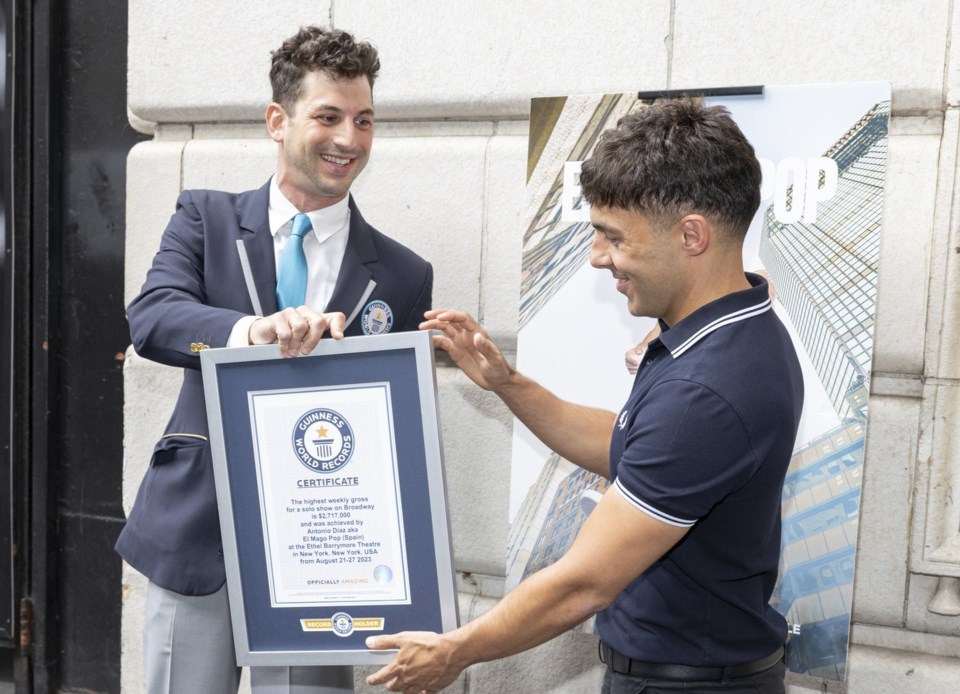NEW YORK (AP) — Achieving the title of youngest driver to win a Formula One World Championship is really hard. Or having the most ascents of Mount Everest. But what about most soda cans crushed with your feet in a minute?
Guinness World Records is celebrating its 70th anniversary by giving regular folks a way to get into a list of their famous accomplishments — offering some unclaimed potential titles and creating an online quiz to help readers match personality types to possible records.
Do you stay calm and pace yourself? Or are you all about getting it done quickly? Answers to five questions like that online lead to world record options to attempt — like most eggs stacked in one minute or farthest distance bottle flip.
There's also a list of 70 unclaimed titles, like fastest time to make a burrito, longest marathon playing air guitar and most anchovies eaten in a minute. They're sorted by headings: speed, power, precision, passion, patience, one for under-16s and another with a friend or pet, like most items caught by a cat in a minute.
“I am completely of the opinion that we’re all amazing in our own way, it’s just discovering what that thing is and celebrating it,” says Editor-in-Chief Craig Glenday. “I want to see kids in the same book as Usain Bolt.”
It started with a pub
dispute
First published in 1955, the annual book — initially conceived to settle pub arguments — has developed into an international phenomenon, selling 155 million copies in more than 40 languages. The publication itself is listed as the world’s bestselling copyrighted book.
It started when Sir Hugh Beaver, then managing director of the Guinness Brewery, was invited to go game bird hunting in Ireland. He and his companions soon began to squabble over which was Europe’s fastest game bird. There was no quick way to solve the dispute.
Beaver dreamed up a pamphlet that could be sold to pubs alongside barrels of Guinness stout. He asked twins Norris and Ross McWhirter, who were fact-finding researchers, to compile something that would be different from the day’s encyclopedias, which were dry and very highly academic.
Glenday has been in charge of the books since the 50th anniversary and has been democratizing the record-keeping, opening up entries for things like the most sweaters worn and the loudest burp. He believes striving for goals is an innately human thing.
“The more open and free it is to everyone to have a go, I think the more we all collectively benefit,” he says. “It’s not like there’s a piece of cake that’s going to be eaten and it’s all gone. We can just keep adding and adding.”
‘Officially amazing’
Unlike the Olympics, which decides what is and what is not a proper sport, Guinness World Records embraces all kinds of achievement, as long as they're meaningful, interesting and a degree of effort has been made. “Otherwise, it’s official, but it’s not amazing. And we have to be officially amazing,” he says.
Guinness World Records is where you'll find Ashrita Furman of New York City, who jumped the 1,899 steps of the CN Tower in Ontario, Canada, on a pogo stick in a record time of 57 minutes and 51 seconds.
“He is a real athlete,” says Glenday. “Who else is celebrating these people and accrediting them and validating their amazing thing? No one, apart from us. So I can see why after 70 years we’re still relevant.”
To those critics who say Glenday is making a mistake by elevating, for instance, the men’s high jump world record holder in the same pages as the fastest person to ever push an orange for one mile using their nose, he disagrees. Both require concentration, training and dedication.
“To me, it is the same discipline, the same mindset. It's just society’s been sort of programmed to think one is more impressive than the other.”
Mark Kennedy, The Associated Press



